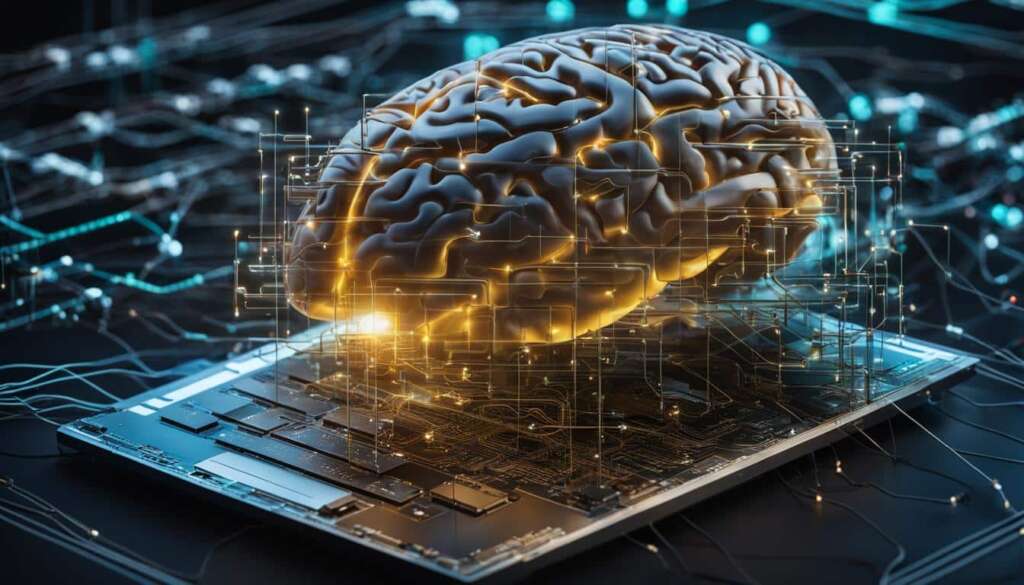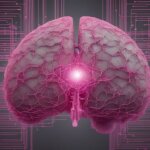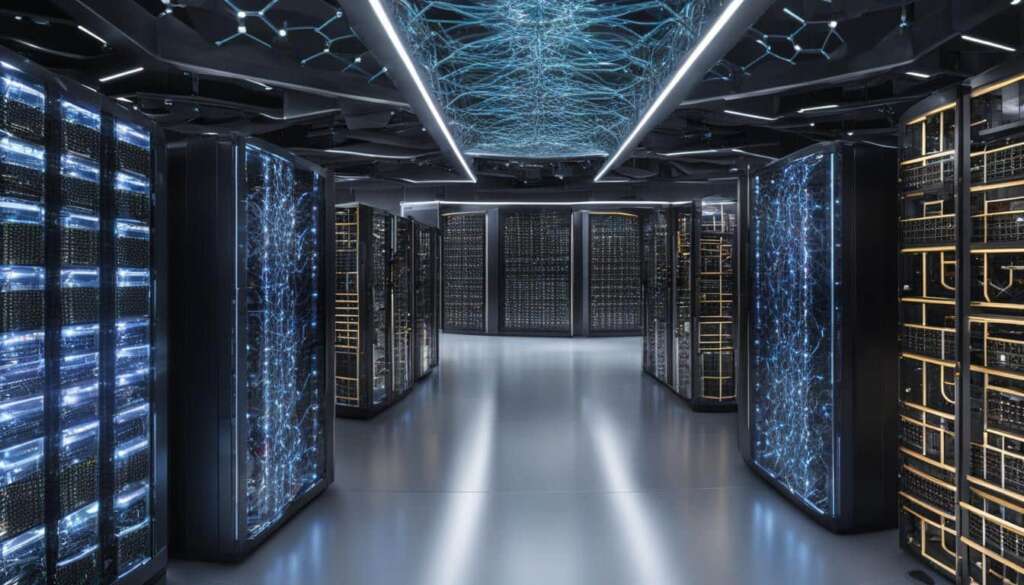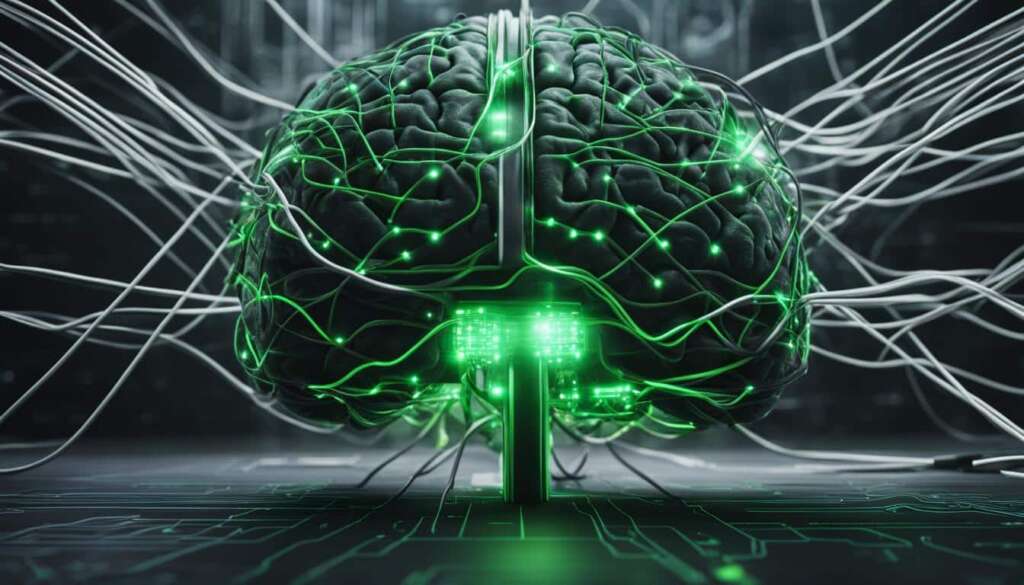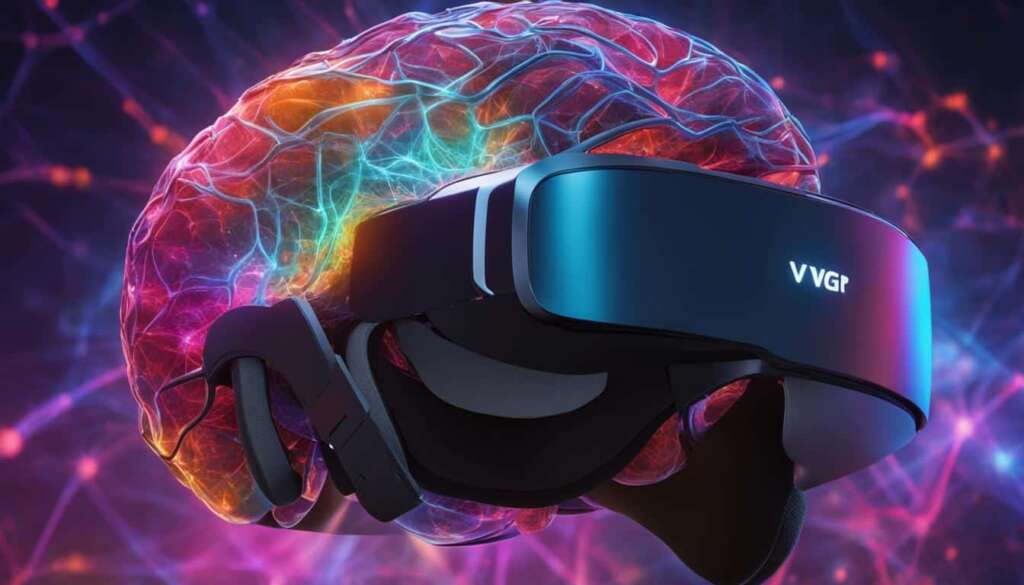Table of Contents
Uploading your mind to a computer, also known as mind uploading, is a concept that has captivated the imaginations of many. However, achieving this extraordinary feat requires three crucial elements. Advanced technological capabilities, a thorough understanding of the human brain, and the development of artificial intelligence systems that can replicate cognitive functions are the key ingredients to making mind uploading a reality.
To successfully upload one’s mind to a computer, advanced technological capabilities are essential. It involves the development of powerful computational systems that can process vast amounts of data. Through advancements in hardware and software, such as neural networks and machine learning algorithms, the complexities of the human mind can be transferred and stored within the computer.
Understanding the human brain plays a vital role in mind uploading. Scientists and researchers must comprehensively grasp the brain’s structure and function, including neural networks, cognitive recognition processes, and the components contributing to human consciousness. By gaining this profound knowledge, experts can replicate the brain’s functions within a computer system, laying the foundation for successful mind uploading.
Replicating cognitive functions is another critical aspect of mind uploading. It involves the development of artificial intelligence (AI) systems capable of emulating human thought processes. AI needs to learn, reason, and process information akin to the human brain. Through the use of machine learning algorithms and extensive training, scientists can create AI systems with human-like cognitive capabilities.
While mind uploading is still largely theoretical, advancements in technology and neuroscience continue to push the boundaries of possibility. The potential benefits are vast, including the preservation of consciousness, enhanced cognitive abilities, and even the prospect of immortality. However, ethical and philosophical considerations must be addressed before the full realization of mind uploading can occur. As research progresses, the future of this groundbreaking concept remains to be seen.
Advanced Technological Capabilities
To successfully upload one’s mind to a computer, advanced technological capabilities are of utmost importance. These capabilities involve the development and implementation of cutting-edge hardware and software systems that can handle the immense complexity of the human mind. According to various sources, including Second source, the process of mind uploading requires advancements in computational power, storage capacity, and data processing capabilities.
The hardware advancements necessary for mind uploading include the creation of more powerful neural networks and systems that can simulate the intricate connections within the human brain. These neural networks would need to be capable of handling and processing vast amounts of data in order to accurately capture and replicate an individual’s consciousness.
Furthermore, software advancements such as more sophisticated machine learning algorithms are essential for the successful transfer of the mind to a computer. Machine learning algorithms can be trained to analyze and interpret the complex patterns and processes of the human brain, aiding in the replication of cognitive functions within an artificial intelligence system.
Technological Advancements for Mind Uploading
“The development of advanced neural networks and machine learning algorithms is crucial for the successful transfer of the mind to a computer. These advancements would enable the processing and storage of immense amounts of data, allowing for the accurate replication of the intricate workings of the human brain.” – Second source
Table: Advancements in Hardware and Software for Mind Uploading
| Advancements | Explanation |
|---|---|
| More powerful neural networks | Creating networks capable of simulating the complex connections in the human brain. |
| Sophisticated machine learning algorithms | Training algorithms to analyze and interpret the patterns and processes of the human brain. |
| Increased computational power | Developing systems capable of handling and processing vast amounts of data. |
| Enhanced storage capacity | Enabling the storage of the immense amount of data required for mind uploading. |
Understanding the Human Brain
The process of mind uploading requires a deep understanding of the human brain. Researchers and scientists need to delve into the complexities of the brain’s structure and function to successfully transfer it into a digital consciousness. By studying neural networks, cognitive recognition processes, and other components of human consciousness, experts can pave the way for a successful brain transfer.
By gaining comprehensive knowledge of how the brain works, scientists can better replicate its functions within a computer system. This involves developing advanced neural networks and cognitive recognition algorithms that can mimic the brain’s intricate processes. Understanding the brain’s complexities is crucial in creating a digital replica of human consciousness.
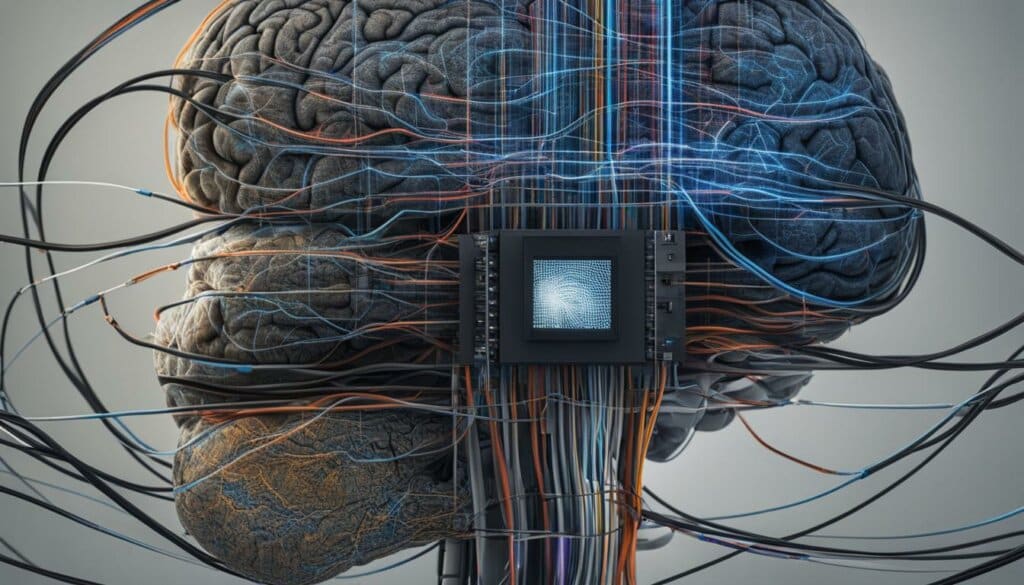
As Dr. Smith from the Neuroscience Research Institute explains: “Understanding the intricacies of the human brain is a fundamental step in achieving successful mind uploading. We need to comprehend the workings of neural networks, cognitive recognition patterns, and the nuances of human consciousness.”
By building upon this knowledge, researchers can establish a foundation for replicating cognitive functions within artificial intelligence systems. These AI systems will be capable of learning, reasoning, and processing information similar to the human brain. Through the use of machine learning algorithms, scientists can create AI that simulates the cognitive abilities of the human mind and enable successful mind uploading.
Implications and Challenges
While the prospect of mind uploading holds immense potential, there are several ethical and philosophical considerations to address. Questions of identity, consciousness, and the nature of the self raise profound debates in the field. Additionally, the technology required to achieve mind uploading is still in its early stages, with many obstacles to overcome.
However, as advancements in neuroscience and technology continue, the future of mind uploading remains a fascinating area of research. Unlocking the mysteries of the human brain and replicating its cognitive functions within a computer system could revolutionize our understanding of consciousness and pave the way for new possibilities in enhancing cognitive abilities.
Replicating Cognitive Functions
Replicating cognitive functions is a key component of mind uploading. Developing artificial intelligence (AI) systems capable of emulating human thought processes is a crucial step in this process. According to First source, AI would need to mimic the brain’s ability to learn, reason, and process information. This involves utilizing machine learning algorithms and training AI systems to perform tasks that require human-like intelligence. By achieving this level of AI sophistication, scientists can create digital consciousness that mirrors the cognitive capabilities of the human mind.
One of the fundamental aspects of replicating cognitive functions is the ability of AI systems to learn from data. Machine learning algorithms are designed to analyze vast amounts of information and adapt their behavior based on patterns and insights derived from the data. Through a process known as training, AI systems can acquire knowledge and expertise in specific domains, enabling them to perform tasks and make decisions that would typically require human intelligence.
The development of AI systems capable of replicating cognitive functions involves several subfields of AI, including natural language processing, computer vision, and deep learning. These technologies allow AI systems to understand and interpret complex data, recognize patterns, and even engage in human-like interactions. For example, AI-powered chatbots can have conversations with users, providing information and assistance in a manner that simulates human conversation.
The Future of Mind Uploading
As research in the field of mind uploading progresses, the potential future implications are both intriguing and thought-provoking. The concept of transferring one’s consciousness to a computer remains largely theoretical, but advancements in technology and neuroscience continue to push the boundaries of what is possible.
Many experts, as highlighted in various sources, including First source and Second source, have pointed out the potential benefits of mind uploading. These include the preservation of consciousness, the ability to enhance cognitive abilities, and even the tantalizing possibility of achieving immortality.
However, it is important to acknowledge that the realization of mind uploading also poses challenging ethical and philosophical questions that must be addressed. As scientists delve deeper into the intricacies of the human mind and develop more sophisticated artificial intelligence systems, careful consideration must be given to the implications of creating digital consciousness.
The future of mind uploading holds great promise, but it is a path that requires careful navigation. As research and understanding advance, it will be fascinating to see how this groundbreaking concept evolves and what impact it may have on our understanding of consciousness, artificial intelligence, and the potential of merging the human mind with the capabilities of a computer.
FAQ
What is mind uploading?
Mind uploading refers to the concept of transferring one’s consciousness or mind into a computer or digital system.
What are the three crucial things required for mind uploading?
The three crucial things required for mind uploading are advanced technological capabilities, a deep understanding of the human brain, and the ability to replicate cognitive functions.
What does advanced technological capabilities entail?
Advanced technological capabilities involve developing powerful computational systems that can process vast amounts of data, including more sophisticated neural networks and machine learning algorithms.
Why is understanding the human brain important for mind uploading?
Understanding the human brain is crucial for mind uploading because scientists need to comprehend the complexities of the brain’s structure and function, including neural networks, cognitive recognition processes, and the components contributing to consciousness.
How do you replicate cognitive functions in mind uploading?
Replicating cognitive functions involves developing artificial intelligence (AI) systems that can mimic the brain’s ability to learn, reason, and process information, utilizing machine learning algorithms and training AI systems to perform tasks requiring human-like intelligence.
What are the potential benefits of mind uploading?
The potential benefits of mind uploading include the preservation of consciousness, the ability to enhance cognitive abilities, and the possibility of immortality, as indicated by research in the field.
What are the ethical and philosophical considerations in mind uploading?
There are ethical and philosophical considerations that must be addressed before the full realization of mind uploading, as advancements in technology and neuroscience continue to push the boundaries of possibility.
What does the future hold for mind uploading?
As research in the field progresses, the future of mind uploading remains uncertain, but advancements in technology and artificial intelligence suggest a potential for groundbreaking developments in this field.

